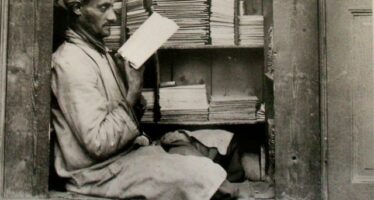Lana Nasser: Mixing Women’s Liberation with Normalization
![]()

Having failed to cause much of a stir in her previous works, Nasser is now undertaking a new project called “Connecting Daughter” in cooperation with women from Israel, Holland, and Palestine. (Carlos Latuf – Brazil)
By: Mahmoud Munir
Jordanian playwright, performer, and translator Lana Nasser (b. 1977) uses the stage to tell the stories of women who have escaped male authority, rejecting masculinity in all its forms.
Nasser returned to Jordan in 2008 after studying psychology and theater in the US. Through her plays and other activities, she promotes a rather narrow vision of women’s liberation that is limited sexual freedom.
Among her activities in Jordan, she facilitates workshops and organizes “Journeys to Jordan,” where she takes tourists on spiritual excursions to ancient sites and nature reserves.
Her theatrical works such as “Red Bag” and “Arab Women Talking,” are minimalist events that rely almost completely on the “art of talking,” in which she repeats pre-packaged expressions about sexual repression and discrimination against women.
Her works tend to attribute all social ills to male domination, ignoring critical factors such as class struggle and the impact of occupation, perhaps in order not to alienate the European funders that underwrite most of her work.
Having failed to cause much of a stir in her previous works, Nasser is now undertaking a new project called “Connecting Daughters” in cooperation with women from Israel, Holland, and Palestine.
They plan to walk on foot together from Jordan to occupied Jerusalem over the course of ten days in March – a journey “in which the daughters of the three women of Abraham: Sarah, Hagar, and Ketura, go on a journey together to show the world that another way is possible,” according to the project’s website.
“Guided by the feminine principle of gentleness and cooperation,” the mission statement continues, “the project aims to transcend borders, cultural backgrounds, languages, and religions. It is about finding peace, and making peace, within and without.”
This article is an edited translation from the Arabic Edition.
Related Articles
Europe falls from its pedestal, no respite in the dictatorships
![]()
“Our latest world press freedom index contains welcome surprises, highlights sombre realities and confirms certain trends,” Reporters Without Borders secretary-general
Entrevista con Alain Badiou
![]()
Todo lo que necesitas es amor Eduardo Febbro Página/12 Alain Badiou es un pensador que podría llamarse polifónico: ha abordado
Arabic literature: a little gold mine
![]()
Marcia Linx Qualey runs a very interesting blog. a fascinating one for many aspects. It is called “Arab literature in English” and it is an incredible source of information, reviews, suggestion




